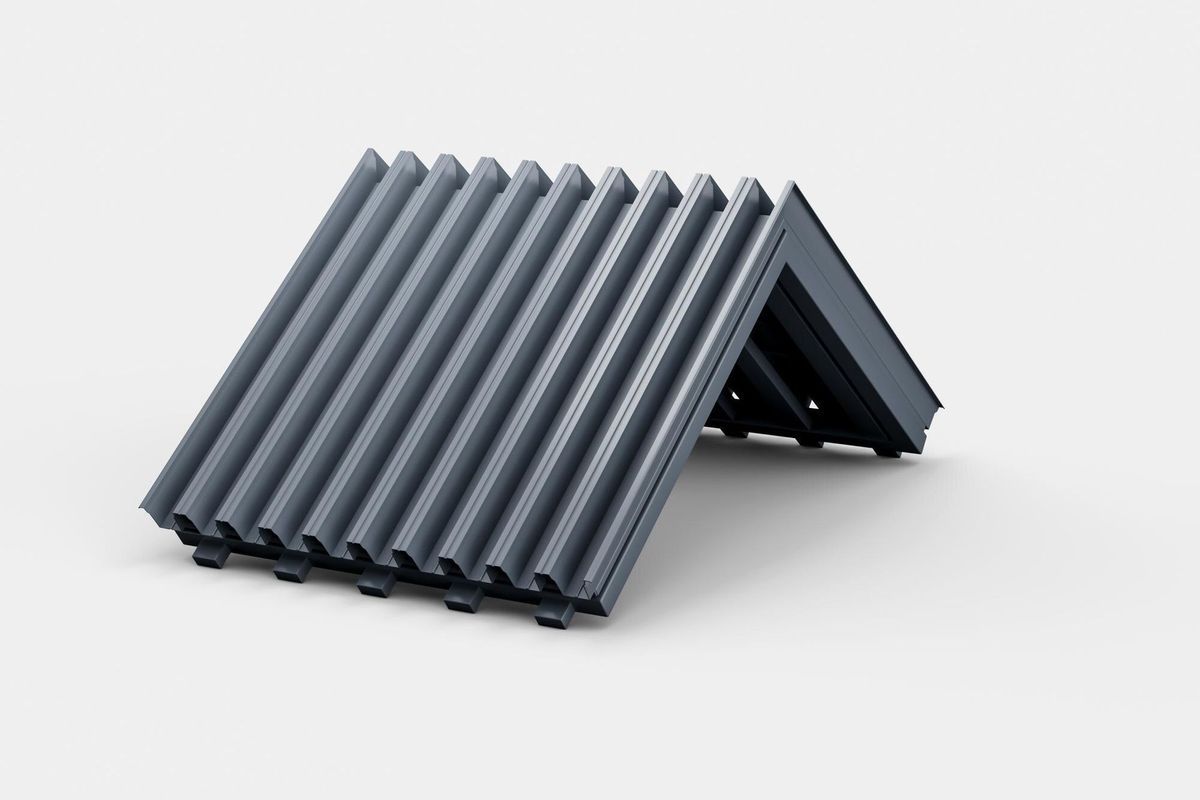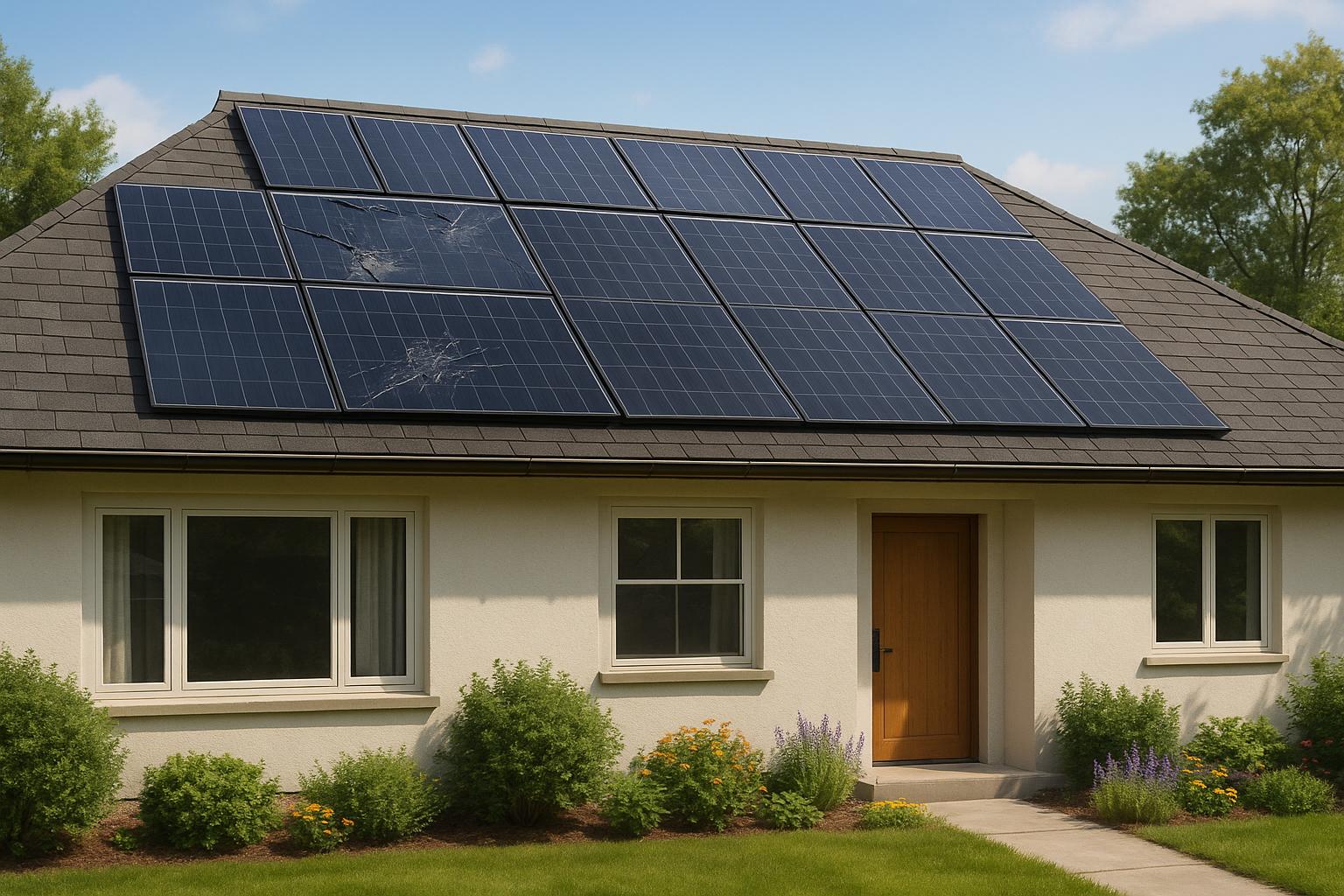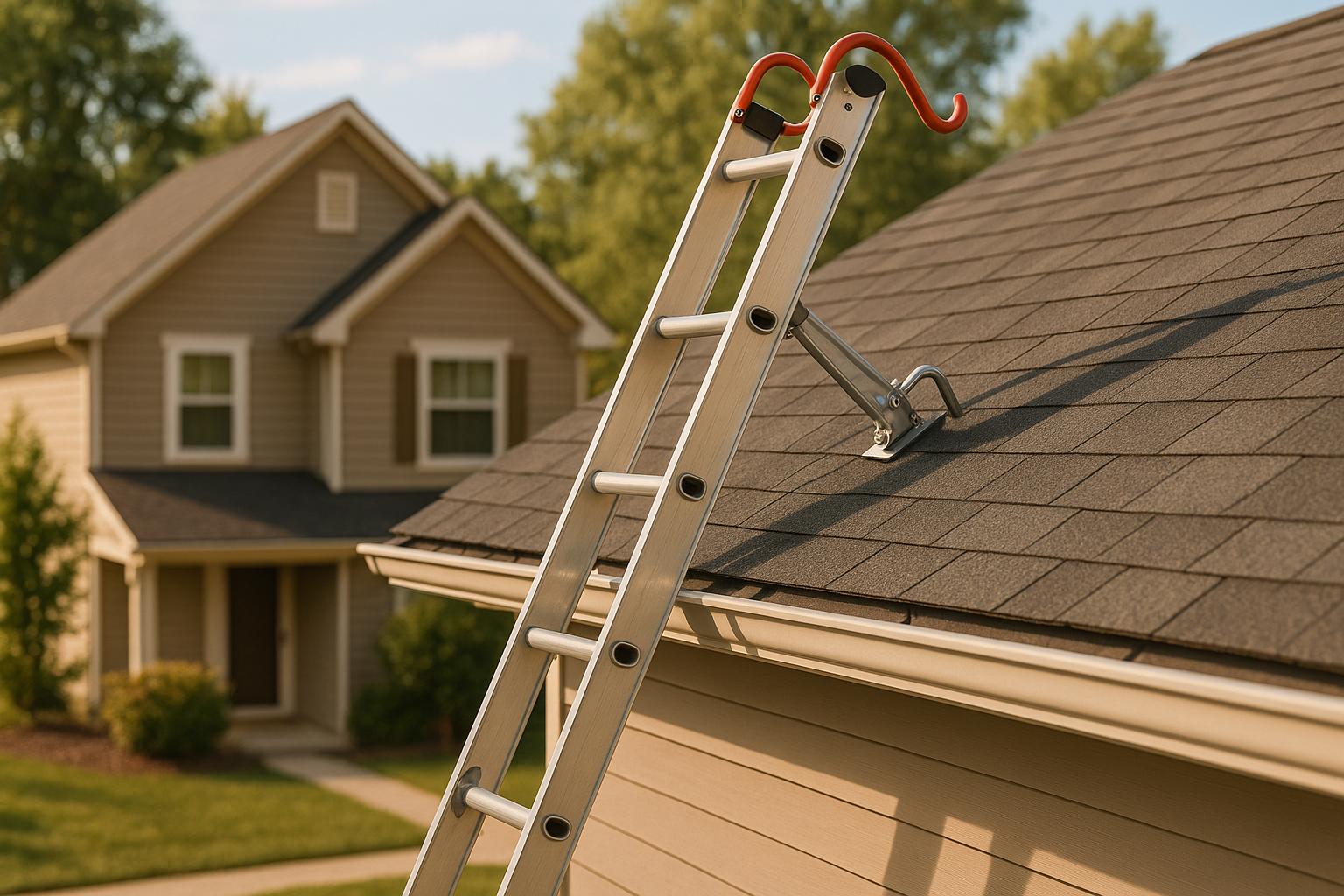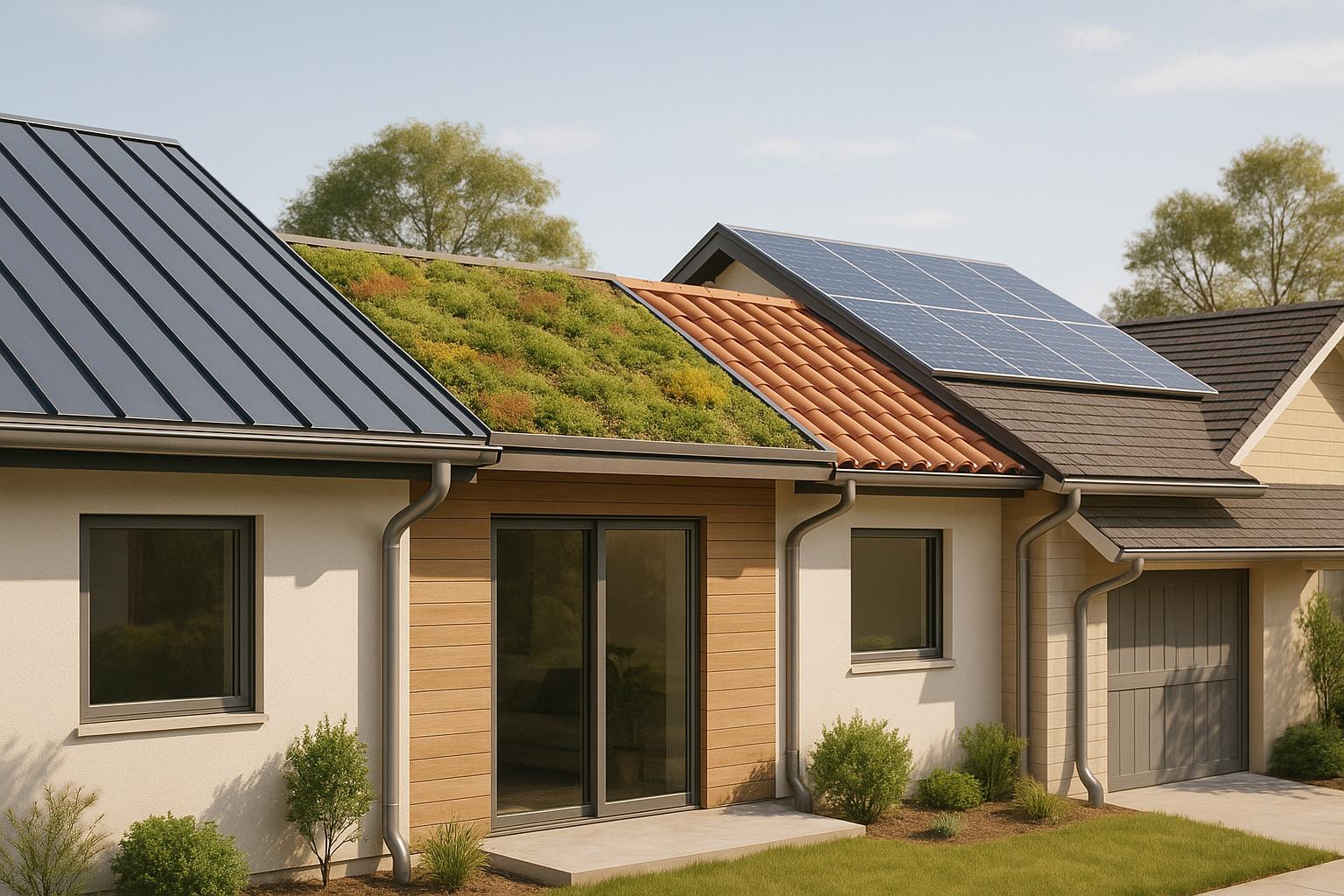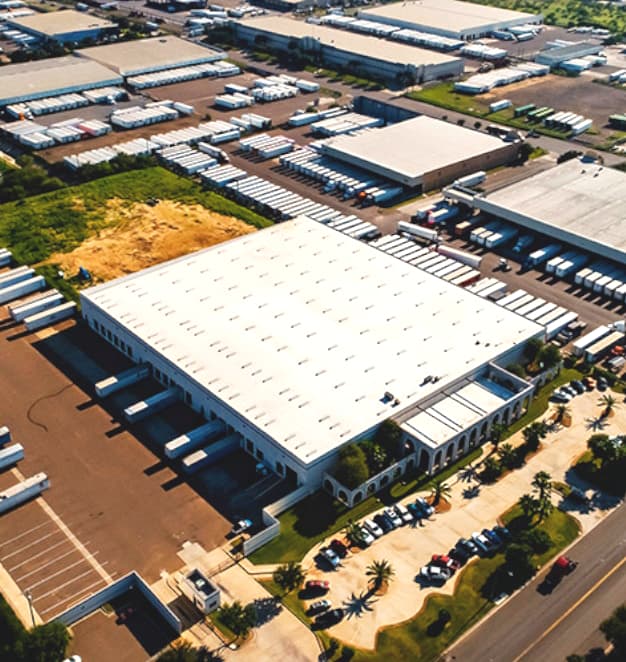Understanding Your Roofing Options
Choosing the right roofing material is crucial for any property owner. Two popular choices often come up in Southern California: metal roofs and asphalt shingles. Each has its own set of benefits and fits different aesthetic and functional needs.
Metal roofs are known for their longevity and energy efficiency. They offer a modern look that can withstand the test of time and harsh weather conditions. These roofs are highly durable and can save you money on energy bills due to their reflective properties, keeping your home cooler in the hot California sun.
Asphalt shingles, on the other hand, are a traditional favorite. They’re cost-effective and come in a variety of styles and colors, allowing for flexibility in design. They provide reliable protection and are easier to install, making them a practical choice for many homeowners.
Why do these two options dominate the Southern California market? It comes down to climate and style preferences. Metal roofing’s durability suits the region’s weather patterns, while asphalt shingles provide an affordable and versatile solution. Both are tailored to meet the unique demands of local property owners.
Understanding these options helps make an informed decision for your roofing needs, ensuring your property remains protected and visually appealing.
Durability and Lifespan
Metal roofs and asphalt shingles both have their strengths, but when it comes to durability and lifespan, metal often takes the lead. A metal roof can last between 40 to 70 years or even longer, making it a solid investment for those looking for longevity. Its resistance to severe weather conditions like hail, wind, and fire adds to its appeal. For those interested in the installation process and the benefits of various commercial roofing systems, our step-by-step guide to commercial roof installation provides detailed insights.
In contrast, asphalt shingles offer a lifespan ranging from 15 to 30 years. While they may not last as long as metal, they still provide reliable protection for many homeowners. Asphalt shingles are more prone to damage from the elements, but they remain a cost-effective option for many residential properties. To explore more about selecting the right roofing materials for residential properties, including the benefits of asphalt shingles, our residential roofing services page offers valuable guidance.
Here’s a quick comparison of metal and shingle roofs:
- Lifespan: Metal roofs last 40-70 years; shingles last 15-30 years.
- Weather Resistance: Metal offers high resistance to hail, wind, and fire; shingles have less resistance.
- Maintenance: Metal requires less frequent maintenance; shingles may need more regular checks.
Warranties for these materials vary. Metal roofs often come with more extended warranties due to their durability. Shingle warranties are generally shorter but can still offer peace of mind for homeowners.
Understanding these factors helps you make an informed choice about which roofing solution aligns best with your property’s needs.
Cost Considerations
When deciding between metal and shingle roofs, cost is a major factor. Metal roofs usually come with a higher upfront price tag. The materials are pricier, and the installation requires specialized skills which add to the cost. But here’s the thing: metal roofs pay off in the long run. Their durability and energy efficiency often lead to savings over time. For instance, our corrugated metal roof installation project for a warehouse in California highlights the durability and weather resistance that metal roofing provides, showcasing how it can be a worthwhile investment.
Asphalt shingles, on the other hand, are more budget-friendly initially. They don’t require the same level of investment upfront, making them a popular choice for many. But don’t forget, they might need more frequent repairs and replacements down the road, which can add up. To understand more about the benefits of asphalt roofing, our asphalt tiles roof installation guide details how this material enhances both durability and energy efficiency, making it a practical choice for residential properties.
Here’s a breakdown of what to consider:
- Initial Costs: Metal roofs are more expensive at first; asphalt shingles are cheaper initially.
- Maintenance and Repairs: Metal roofs typically need less upkeep; shingles might require more frequent attention.
- Longevity and Replacement: Metal can last decades longer, reducing replacement frequency; shingles have a shorter lifespan.
Ultimately, it’s about balancing your budget with your long-term plans. If you’re looking for a roof that lasts and offers energy savings, metal might be worth the investment. If keeping initial costs low is more important, shingles could be the way to go.
Environmental Impact
When you’re thinking about the environment, roofing choice matters. Metal roofs are a great option for eco-conscious folks. They’re recyclable, which means at the end of their lifespan, they can be reused rather than dumped in a landfill. Plus, metal roofs often contain recycled materials right from the start, making them a greener choice.
Another bonus? Metal roofs help with energy efficiency. They reflect sunlight, which keeps your home cooler and can reduce your energy bills. Less energy use means a smaller carbon footprint, making metal roofs a sustainable option.
Now, let’s talk asphalt shingles. These are petroleum-based, so they have a bigger environmental footprint. When they reach the end of their life, they often end up in landfills, contributing to waste. If sustainability is a priority, it’s something to think about. For more insights on choosing the right roofing materials and understanding their impact, consider exploring our essential insights and tips for residential roofers.
Here’s a quick rundown:
- Recyclability: Metal roofs can be recycled; asphalt shingles usually can’t.
- Energy Efficiency: Metal reflects heat, reducing energy use; shingles absorb more heat.
- Environmental Footprint: Metal has a smaller carbon footprint; shingles are petroleum-based.
Choosing the right roof isn’t just about durability or cost. The environmental impact is key, especially if you’re looking to make greener choices for your property.
Ease of Installation and Repair
Installing and repairing roofs involve different levels of complexity depending on the material. Metal roofing, for example, is more complex and requires skilled professionals. These roofs need precise fitting and secure installation to ensure long-lasting protection. The installation process involves handling large metal sheets, which demands expertise and experience. This often translates into higher labor costs and fewer available contractors skilled in metal roofing. For more detailed insights on the installation process, you can explore our expertise in warehouse roofing installations, which highlights the use of durable materials like corrugated metal to ensure structural integrity and weather resistance.
Asphalt shingles are simpler to install. They’re lightweight and come in manageable sizes, making them easier to handle. This means more contractors are available for the job, which can lead to competitive pricing. Repairs for shingle roofs are typically straightforward, allowing for quick fixes when needed.
Here’s what you should know about installation and repair:
- Skill Level: Metal requires skilled labor; shingles are easier with more contractors available.
- Labor Costs: Installing metal is costlier due to complexity; shingles often come with lower labor costs.
- Repair Complexity: Metal repairs can be intricate; shingles allow for simpler repairs.
Understanding these factors helps you decide which roofing option matches your needs and the availability of skilled professionals in Southern California. Whether you’re prioritizing ease of installation or looking at long-term repair needs, knowing what to expect can guide your choice.
Aesthetics and Style Options
When it comes to aesthetics, both metal and shingle roofs offer distinct styles that can enhance your property’s curb appeal. Metal roofs provide a sleek, modern look with a wide range of colors to choose from. This allows homeowners to achieve a contemporary design that stands out. Whether you prefer a bold or subtle appearance, metal roofing can match various architectural styles, making it a versatile choice for modern homes.
For those interested in integrating solar technology with their roofing, our expertise in solar panel installations on metal roofs ensures that you can enjoy both aesthetic appeal and energy efficiency.
Asphalt shingles, however, are known for their classic appeal. They can mimic traditional materials like slate, wood, and tile, offering a timeless look that many homeowners love. The versatility in design means asphalt shingles can complement a variety of home styles, from historic to contemporary. Their ability to blend traditional aesthetics with modern functionality makes them a popular option.
Choosing the right material isn’t just about durability or cost. It’s also about how your roof looks and feels in harmony with your home’s design. Metal roofs contribute to a cutting-edge aesthetic, while shingle roofs provide a more conventional charm. Consider your home’s architecture and your personal style preferences when deciding which roofing material best suits your needs. Whether you lean towards the modern or the traditional, each option offers unique benefits that can enhance your home’s overall appearance.
Weather Performance and Safety
Metal roofs excel in challenging weather conditions. They offer robust protection against wind, rain, and fire. This makes them a strong choice for weather-prone areas. Their design helps them withstand heavy winds and impacts from hail, keeping your home safe during storms. The fire-resistant properties add another layer of protection, crucial in dry, fire-prone regions. For more detailed insights into metal roofing options, including the best metal roof vent options for enhanced ventilation, you can explore our comprehensive guide on metal roof ridge vents.
Asphalt shingles, while popular, are more susceptible to weather-related damage. They can handle regular weather but may struggle with extreme conditions. High winds can lift shingles, leading to potential leaks. Heavy rain can exacerbate this issue, increasing the likelihood of water damage. However, shingles do offer good support for foot traffic, making roof maintenance easier. If you’re concerned about potential water damage from roof vent leaks during heavy rain, our article on fixing roof vent leaks provides effective solutions and preventive measures.
Here’s a quick look at the safety features:
-
Metal Roofs:
- Wind Resistance: High resistance to strong winds.
- Fire Safety: Excellent fire-resistant properties.
- Impact Durability: Withstands hail and debris impact.
-
Asphalt Shingles:
- Foot Traffic: Supports maintenance activities.
- Water Resistance: Adequate for typical rain but vulnerable to heavy storms.
- Wind Vulnerability: More prone to wind damage.
Understanding these aspects assists homeowners in selecting the right roofing material to protect their homes, especially in areas prone to severe weather conditions.
Energy Efficiency and Solar Compatibility
Metal roofs offer significant advantages in energy efficiency and solar compatibility. They have reflective properties that bounce solar heat away, keeping your home cooler and helping to cut down on cooling costs. This makes them a strong choice if you’re looking to reduce those energy bills. Plus, metal roofs are a perfect match for solar panel installations. Their sturdy structure supports solar panels effectively, allowing for seamless integration. For more insights on integrating solar panels with different roofing types, explore our solar panel installation projects.
Asphalt shingles absorb more heat, which could mean higher cooling expenses. This makes them less energy-efficient compared to metal roofs. While you can still install solar panels on shingle roofs, they might not offer the same efficiency benefits as metal roofs do.
Here’s a quick comparison to help you see the differences clearly:
-
Energy Efficiency:
- Metal Roofs: Reflect solar heat, reducing cooling costs.
- Asphalt Shingles: Absorb heat, potentially increasing energy expenses.
-
Solar Compatibility:
- Metal Roofs: Ideal for solar panel installation due to durability and reflective properties.
- Asphalt Shingles: Compatible but less efficient for solar integration.
Choosing the right roofing material impacts energy consumption and sustainability. Metal roofs provide a practical solution for those looking to lower energy usage and embrace renewable energy options.
Navigating Community and HOA Restrictions
Homeowners associations (HOAs) and community guidelines can significantly impact your choice of roofing materials. Understanding these restrictions is crucial to avoid conflicts and ensure compliance with local standards.
Many HOAs prefer or even mandate asphalt shingles due to their traditional look, which aligns with the community’s aesthetic guidelines. These shingles are often seen as more harmonious with the overall neighborhood appearance. For more insights on the various roofing materials, including asphalt shingles, explore our extensive service offerings for both commercial and residential roofing projects.
Metal roofs, while durable and efficient, might face more scrutiny. Some HOAs have concerns about the reflective surface and modern appearance of metal roofing, fearing it could disrupt the visual consistency of the area. It’s essential to review your HOA guidelines and community rules before making a decision.
Here’s what you should consider:
- Review Guidelines: Check HOA documents for any roofing restrictions or preferences.
- Aesthetic Concerns: Ensure your choice aligns with community aesthetics to avoid disputes.
- Approval Process: Submit your roofing plans for approval if required by the HOA.
- Material Restrictions: Verify if there are any prohibited materials or styles.
For a deeper understanding of roofing techniques and materials, including the importance of proper installation, our comprehensive guides on roofing topics provide essential insights for both residential and commercial clients.
Understanding these factors helps you navigate community and HOA restrictions, allowing you to choose a roof that meets your needs while respecting local guidelines. It ensures a smooth process, avoiding potential compliance issues.
Making the Right Choice for Your Home
Choosing the perfect roof is a big decision for any homeowner. It’s about balancing what matters most to you—be it budget, durability, aesthetics, environmental impact, or local guidelines. Metal roofs stand out with their long lifespan, energy efficiency, and modern design flexibility. They’re a strong contender for those seeking durability and a sleek look. If sustainability is a priority, the recyclability of metal roofs is a big plus.
On the other hand, asphalt shingles offer a classic appearance that appeals to those with traditional tastes. They’re cost-effective upfront and versatile in style, fitting a range of architectural designs. While they might need more maintenance over time, they remain a practical choice for many.
Consider what’s most important for your home and lifestyle. Whether it’s the longevity and energy savings of metal or the initial affordability and traditional charm of shingles, each option has its unique strengths. Assessing these factors in the context of your specific needs will guide you to the best choice for your roofing project.
Want more personalized guidance or a detailed quote? Feel free to get in touch with us by filling out our contact form, where you can request a free quote tailored to your project. Our team at Prime American Roofing is ready to help you make the best decision for your home.

